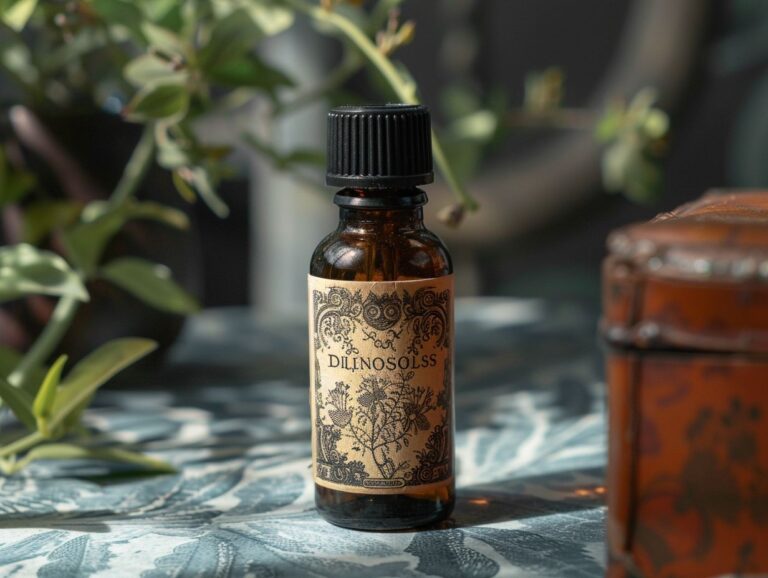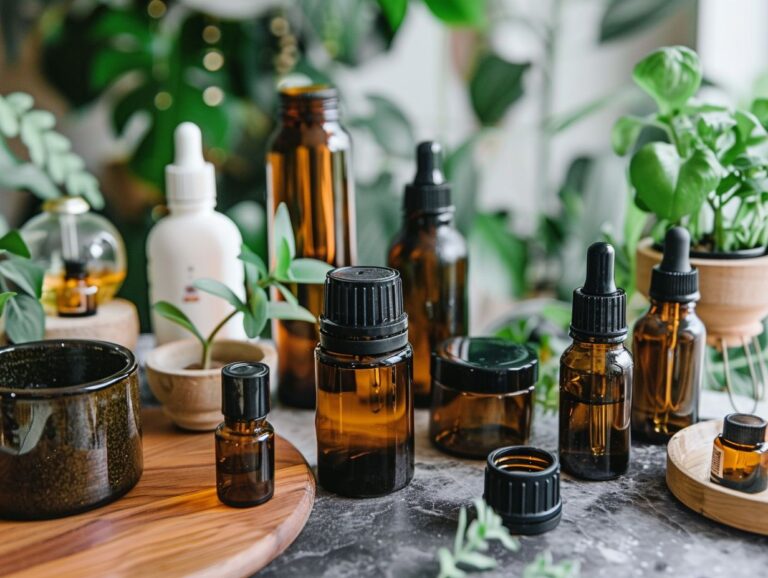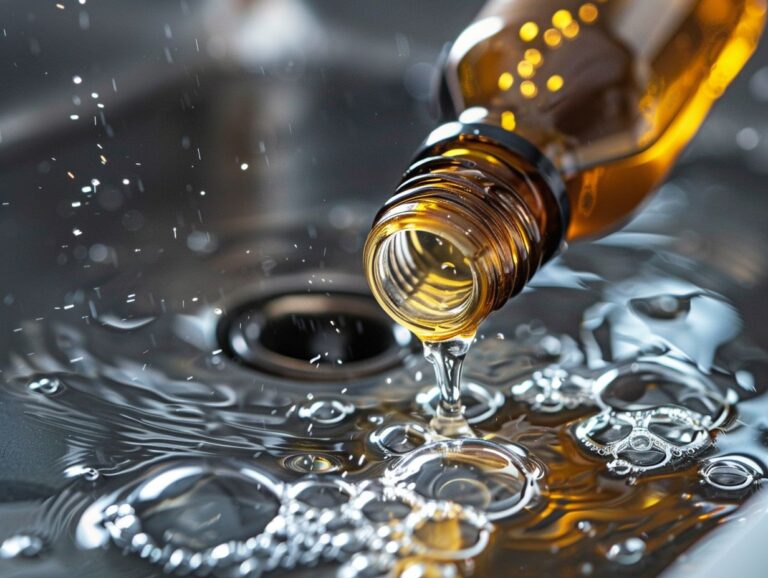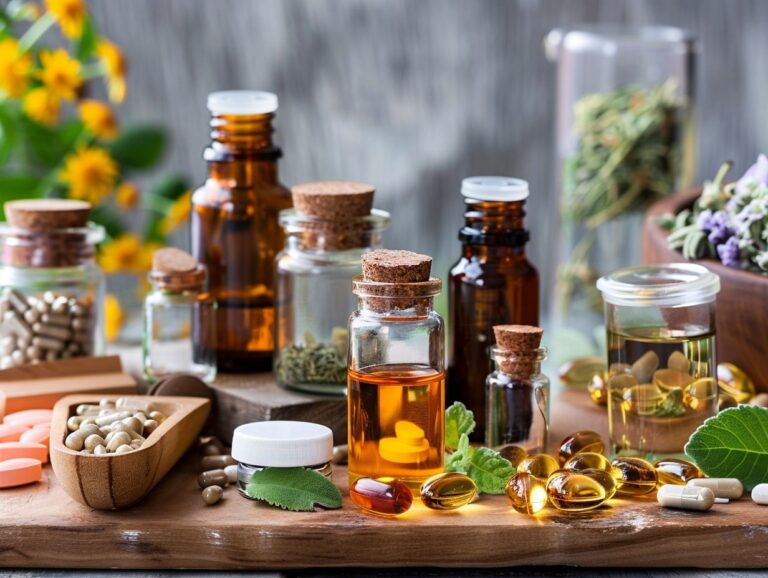Is Young Living the Best Essential Oils
If you’ve ever wondered about essential oils and their benefits, you’re in the right place.
We will explore the world of essential oils, focusing on the renowned brand Young Living.
From the advantages of using essential oils for aromatherapy, pain relief, and mood enhancement, to the potential risks and how to use them safely, we’ll cover it all.
Find out why Young Living is considered the best essential oils brand and why it’s important to use them responsibly.
Key Takeaways:
What Are Essential Oils?
Essential oils are highly concentrated plant extracts that capture the aromatic compounds from various parts of plants like leaves, flowers, roots, and stems.
One of the oldest methods of extracting essential oils is steam distillation, where the plants are subjected to steam to release their aromatic compounds, which are then condensed into a liquid form. Another common extraction method is cold pressing, which is often used for citrus fruits. These oils are known for their versatility, used in aromatherapy to promote relaxation, improve mood, and even aid in skincare routines. The popularity of essential oils continues to grow, with many people incorporating them into their daily wellness rituals.
What Are the Benefits of Essential Oils?
The benefits of essential oils range from promoting relaxation and stress relief through aromatherapy to aiding in pain relief and supporting overall health and well-being.
Essential oils have been traditionally used for centuries across different cultures for their therapeutic properties. These potent plant extracts are known to have diverse applications beyond just scenting a room. They can be blended with carrier oils to create massage oils for pain relief, such as peppermint oil for headaches or eucalyptus oil for muscle aches. Essential oils are also believed to positively impact mood, with uplifting scents like citrus oils or calming scents like lavender contributing to emotional well-being. Incorporating certain essential oils into a bedtime routine can promote better sleep by relaxing the mind and body.
- When used in a diffuser, essential oils can help purify the air and create a soothing atmosphere, ideal for relaxation and stress reduction.
- Some essential oils, like tea tree oil, possess antibacterial and antifungal properties, contributing to better skin health and immunity when used in skincare products or diffused in the air.
- Studies have shown that certain essential oils, such as lavender and chamomile, can aid in reducing anxiety and improving overall mental health.
Aromatherapy
Aromatherapy utilizes the inhalation or topical application of essential oils to enhance psychological and physical well-being. It is widely used for managing stress, improving sleep quality, and boosting mood.
One of the key principles of aromatherapy is the belief that inhalation of essential oils can stimulate the limbic system in the brain, which is responsible for emotions, memories, and motivation.
Essential oils are concentrated plant extracts known for their therapeutic properties, and they can be applied through methods like diffusion, massage, or added to baths.
Some popular essential oils include lavender for relaxation, peppermint for mental clarity, and tea tree for its antimicrobial properties.
Pain Relief
Essential oils like peppermint, lavender, and eucalyptus are known for their analgesic and anti-inflammatory properties, making them effective for alleviating pain and reducing discomfort.
In terms of pain relief, these essential oils work through various mechanisms. For instance, peppermint oil contains menthol, which has a cooling effect that can help numb pain sensations. Lavender oil is often used for its calming properties, which can help reduce stress-related pain. On the other hand, eucalyptus oil has analgesic and anti-inflammatory effects that can ease muscle soreness and joint pain.
These oils can be applied in different ways depending on the type of pain you are experiencing. Inhalation through diffusers can help with headaches and respiratory issues, while topical application with carrier oils can be beneficial for muscle and joint pain. Adding a few drops of these oils to a warm bath can provide overall relaxation and pain relief.
The benefits of using essential oils for pain relief go beyond just their physical effects. Many people find that the soothing scents of these oils can also have a positive impact on their mood and emotional well-being, contributing to a holistic approach to pain management.
Improved Sleep
Essential oils such as lavender, chamomile, and cedarwood are popular choices for promoting relaxation and improving sleep quality. Their calming effects can help in achieving a restful night’s sleep.
**Lavender**, known for its soothing aroma, is widely used to reduce anxiety and stress, creating a peaceful environment conducive to sleep.
Chamomile, with its gentle and floral scent, promotes relaxation and can help in unwinding before bedtime.
Cedarwood, with its woody and earthy notes, is believed to have sedative properties that aid in calming the mind for a peaceful slumber.
Mood Enhancement
Certain essential oils like citrus oils, bergamot, and ylang-ylang are known for their mood-boosting properties. They can help in reducing stress, anxiety, and enhancing overall emotional well-being.
These oils work on the limbic system, which is the part of the brain that controls emotions and memories. When inhaled or applied topically, they can trigger a response that promotes relaxation and uplifts the mood.
Citrus oils, such as orange and lemon, have refreshing and energizing scents that can help combat feelings of fatigue and improve focus. Bergamot oil, with its citrusy floral aroma, is particularly effective in relieving feelings of tension and promoting a sense of calm.
Ylang-ylang oil, known for its sweet floral fragrance, is often used to reduce feelings of stress and promote a positive outlook. These oils can be diffused, inhaled directly, or diluted and applied to the skin for their mood-enhancing benefits.
What Is Young Living?

Founded in 1993 by Gary Young, Young Living has grown to become a global leader in the essential oils industry, offering a diverse range of products including single oils, blends, and personal care items.
The company’s dedication to authenticity and transparency goes beyond just their product line. Is Doterra the best oils has a deep commitment to environmental stewardship, supporting local communities worldwide, and upholding ethical sourcing practices.
Through their Seed to Seal process, they meticulously monitor every step of production, from seed planting to bottling, ensuring that customers receive only the purest and most potent essential oils.
Why Is Young Living Considered the Best Essential Oils Brand?
Young Living is often regarded as the best essential oils brand due to its rigorous quality control measures, transparent Seed to Seal guarantee, diverse range of products, and sustainable practices that set it apart in the essential oil industry.
One of the key factors contributing to Young Living’s reputation is its commitment to quality assurance. They have stringent standards in place, ensuring that each essential oil undergoes extensive testing to meet their high-quality benchmarks. This meticulous process not only guarantees the purity and potency of their products but also instills trust among consumers.
Along with quality, Young Living’s wide assortment of products caters to diverse needs. Whether you are looking for essential oils for aromatherapy, skincare, or household cleaning, they have a comprehensive range to choose from. This variety allows customers to explore and benefit from the myriad uses of safe essential oils.
Moreover, Young Living goes beyond just business; they prioritize sustainable practices. From responsible sourcing of raw materials to eco-friendly packaging, the company strives to reduce its environmental footprint. This commitment to sustainability not only aligns with current consumer preferences but also demonstrates their long-term vision for a greener future.
Seed to Seal Guarantee
Young Living’s Seed to Seal guarantee ensures that every step of the essential oil production process, from sourcing raw materials to testing for purity and potency, meets the highest quality standards in the industry.
One of the crucial aspects of Young Living’s Seed to Seal process is the meticulous sourcing of raw materials. The company partners with dedicated farmers who adhere to sustainable farming practices to ensure that only the highest quality plants are used. After harvesting, the raw materials undergo extensive testing to confirm their purity and potency. Young Living’s commitment to quality assurance is further exemplified through their rigorous testing procedures, which involve multiple rounds of analysis to guarantee the effectiveness and safety of their essential oils.
Quality Control
Young Living maintains strict quality control measures to prevent adulteration of oils and ensure that only pure and authentic essential oils reach the consumers. Regular testing using methods like GC-MS confirms the quality and purity of their products.
Quality control is at the heart of Young Living’s commitment to providing top-notch essential oils to its customers. Their dedication to purity is evident in the meticulous processes they follow. By conducting thorough testing, including Gas Chromatography-Mass Spectrometry (GC-MS), Young Living essential oils can guarantee the authenticity and integrity of their products.
One of the key aspects of maintaining high standards is preventing adulteration, a common issue within the essential oil industry. Young Living’s stringent protocols ensure that their oils remain unadulterated, preserving their natural properties and delivering maximum benefits to consumers.
For consumers, ensuring the purity of essential oils is not just about quality; it’s also about safety and efficacy. By adhering to rigorous testing methodologies like GC-MS, Young Living continues to set the benchmark for excellence in the essential oil market.
Sustainable Practices
Young Living is committed to sustainable practices that prioritize environmental conservation, ethical sourcing, and community give the power toment. Their efforts align with global sustainability goals and ensure the long-term viability of essential oil production.
One of the key initiatives that Young Living has undertaken is their reforestation projects, where they plant trees to offset carbon emissions and restore habitats. This not only helps in reducing their carbon footprint but also contributes to overall environmental preservation.
Along with their environmental initiatives, Young Living places a strong emphasis on ethical sourcing policies. They work closely with farmers and growers around the world, ensuring fair wages, proper working conditions, and sustainable farming practices. To know more, check out why use Young Living essential oils.
Moreover, Young Living actively engages with local communities through various programs and partnerships. By give the power toing people at the grassroots level, they create a positive impact that goes beyond just their products, fostering a sense of social responsibility and support.
Wide Range of Products
Young Living offers a diverse range of essential oil products, including single oils, blends, personal care items, and nutritional supplements, all crafted with a focus on quality, purity, and efficacy.
Single oils are potent extracts derived from a single plant source, with popular options like lavender for relaxation and peppermint for invigoration. Blends combine different oils to create synergistic effects, such as Stress Away for relaxation or Thieves for immune support. Personal care items include skincare products like the ART line and the ever-popular Thieves toothpaste. In the realm of nutritional supplements, Young Living offers products like NingXia Red, a superfruit juice blend packed with antioxidants and essential nutrients for overall wellness.
What Are the Potential Risks of Using Young Living Essential Oils?
While Young Living essential oils are generally considered safe when used properly, there are potential risks such as skin irritation, allergic reactions, and interactions with medications that users should be aware of.
It’s important for individuals using Young Living essential oils to perform a patch test before applying them on larger areas of skin to check for any adverse reactions. Caution should be taken when ingesting essential oils as some can be toxic if consumed orally. The FDA recommends diluting essential oils with a carrier oil before topical application to reduce the risk of skin irritation. It’s crucial to consult with a healthcare professional, especially for pregnant or nursing women, before using essential oils to ensure safety and effectiveness.
Adhering to proper guidelines and precautions is essential for maximizing the benefits and minimizing the risks associated with Young Living essential oils.”
Skin Irritation

Skin irritation can occur if essential oils are applied undiluted or in high concentrations. It is essential to perform a patch test before using oils topically to minimize the risk of adverse reactions.
When essential oils are not diluted properly, their potency can lead to irritation due to their concentrated nature. The chemical composition of essential oils, including compounds like terpenes and phenols, can be harsh on the skin when not appropriately diluted. Patch testing, ideally on a small area of skin like the forearm, helps individuals ascertain their skin’s sensitivity to specific oils before wide application.
Proper dilution methods, such as adding essential oils to carrier oils like coconut or jojoba oil, help mitigate skin reactions by reducing the concentration of the essential oil. The importance of patch testing cannot be overstated, especially for those with sensitive skin or prone to allergies, as it allows for early detection of any potential adverse reactions.
Allergic Reactions
Some individuals may be allergic to certain essential oils, leading to allergic reactions like skin rashes, itching, or respiratory issues. It is crucial to perform an allergy test before regular use.
Essential oils are highly concentrated extracts from plants and can trigger allergic reactions in sensitive individuals due to their potent nature.
Common symptoms of an allergic reaction to essential oils include redness, swelling, hives, or even difficulty breathing in severe cases.
To ensure safety, conducting a patch test is recommended before incorporating any new essential oil into your routine.
Interactions with Medications
Essential oils can interact with certain medications, affecting their effectiveness or causing adverse side effects. It is advisable to consult with a healthcare professional before using essential oils alongside prescribed medications.
While essential oils are generally considered safe when used appropriately, they contain potent compounds that can influence the way medications work in the body. For instance, grapefruit essential oil can interfere with enzymes that break down certain drugs, leading to increased concentrations of the medication in the bloodstream.
Similarly, lavender oil may have a sedative effect, which could intensify the drowsiness caused by medications like tranquilizers or sleep aids. Some essential oils, such as peppermint oil, can irritate the stomach lining and may exacerbate gastrointestinal side effects of certain drugs.
Without proper guidance, interactions like these could result in unexpected health consequences. Therefore, it’s crucial to seek guidance from a healthcare provider to ensure the safe and effective use of essential oils in conjunction with medications.
How to Use Young Living Essential Oils Safely?
To use Young Living essential oils safely, it is essential to dilute them properly, perform a patch test before application, follow recommended dosages, and seek guidance from a healthcare professional, especially if you have underlying health conditions or are on medications.
Proper dilution of Young Living essential oils is crucial to prevent skin irritation or sensitivities. Always remember that these oils are highly concentrated and potent, so mixing them with a carrier oil such as almond or coconut oil is necessary to reduce their intensity.
Before using any essential oil on a larger skin area, a patch test is recommended. Apply a small amount of diluted oil on a small patch of skin and observe for any adverse reactions over 24 hours.
In terms of dosages, always follow the guidelines provided by Young Living. Overusing essential oils can lead to skin reactions or other health issues.
It is advised to consult a healthcare professional before using essential oils, especially if you are pregnant, nursing, or have specific health concerns.
Dilute Properly
Properly diluting essential oils with carrier oils like coconut or almond oil helps reduce the risk of skin irritation and sensitization.
The recommended dilution ratio varies depending on the oil and intended use. When using essential oils for topical application, a general guideline is to dilute 1-2 drops of essential oil in 1 tablespoon of carrier oil for adults. For children or those with sensitive skin, a lower dilution ratio of 0.5-1% is recommended. Essential oils should never be used undiluted on the skin as they can cause severe skin reactions.
Patch Test Before Use
Performing a patch test by applying a diluted oil on a small area of skin helps identify any adverse reactions or sensitivities before full application. It is a crucial step in ensuring skin compatibility.
When conducting a patch test, selecting a small inconspicuous area like the inner arm or behind the ear is advisable. The diluted oil should be generously applied and left to interact with the skin for 24-48 hours. Monitoring the test area for any signs of redness, itching, swelling, or blistering is essential to assess skin response. If any adverse reactions occur, wash the area immediately and discontinue use. Always remember that interpretation of patch test results should be done cautiously and consulting a dermatologist or healthcare professional for guidance is highly recommended.
Follow Recommended Dosages
Adhering to recommended dosages for each essential oil is vital to prevent adverse effects or toxicity. These dosages are based on factors like age, health status, and the intended purpose of the oil.
For instance,
- lavender oil is generally safe for most adults when used topically or inhaled, but excessive amounts can cause skin irritation.
- In contrast, eucalyptus oil should be used cautiously around children under 10 years old due to the risk of respiratory issues.
- Pregnant women are often advised to avoid certain oils altogether, such as clary sage, as they can stimulate contractions.
It’s crucial to dilute oils properly for children and those with sensitive skin to minimize the risk of irritation or allergic reactions.
Consult with a Healthcare Professional

Doctors, nurses, or pharmacists can provide valuable guidance on incorporating essential oils into your wellness routine. Specific situations that call for professional consultation include:
- existing medical conditions
- pregnancy or breastfeeding
- interactions with prescribed medications
These experts can help determine the appropriate dilution, usage methods, and any potential side effects. Personalized advice is crucial as it considers your unique circumstances, ensuring maximum benefits while minimizing risks.
Frequently Asked Questions
Is Young Living the Best Essential Oils?
Yes, according to many loyal customers and industry experts, Young Living is considered to be one of the best essential oil brands in the market.
What sets Young Living apart from other essential oil brands?
Young Living stands out for its commitment to purity and quality. The company owns its own farms and distilleries, ensuring that their oils are produced with the highest standards and without any synthetic ingredients.
Are Young Living essential oils safe to use?
Yes, Young Living essential oils are safe when used as directed. The company follows strict safety protocols and all of their oils are rigorously tested for purity and potency.
Are Young Living essential oils certified organic?
While not all of their oils are certified organic, Young Living does offer a line of certified organic oils. However, all of their oils are produced using sustainable and ethical farming practices.
What are some popular Young Living essential oils?
Young Living offers a wide range of essential oils, but some of their most popular ones include Lavender, Peppermint, Lemon, and Frankincense.
Can Young Living essential oils be ingested?
Young Living does have a line of Vitality oils that are specifically labeled for internal use. However, it is important to always follow proper usage and dilution guidelines when ingesting essential oils.








2 Comments